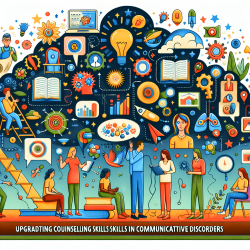Understanding the Role of Friendship in Adolescent Development
Friendship during adolescence is more than just a social connection; it plays a crucial role in shaping an individual's narrative identity. The research article "With a little help from my friends? Perceived friendship quality and narrative identity in adolescence" delves into this dynamic relationship. This study offers valuable insights for practitioners in speech-language pathology and related fields, especially those providing online therapy services like TinyEYE.
The Study's Key Findings
The research conducted by de Moor et al. (2021) examined how perceived friendship quality affects adolescents' narrative identity. The study involved a cross-sectional subsample of 1,087 Dutch adolescents and a longitudinal subsample of 186 adolescents. The findings revealed that high-quality friendships are associated with the presence of redemption sequences and self-event connections in adolescents' narratives. However, these associations were significant within specific time points and not longitudinally.
Implications for Practitioners
As practitioners, understanding the impact of friendship quality on narrative identity can guide therapeutic interventions. Here are some practical ways to implement these findings:
- Encourage Positive Peer Interactions: Facilitate group sessions where adolescents can share experiences and build supportive relationships. This can enhance their narrative identity by promoting positive self-event connections.
- Focus on Narrative Development: Use storytelling and narrative exercises in therapy to help adolescents articulate their experiences. Encourage them to identify redemption sequences in their stories, which can foster resilience and positive identity development.
- Monitor Friendship Dynamics: Be attentive to the quality of friendships your clients have. Encourage discussions about friendships in therapy sessions to understand their influence on the adolescent's narrative identity.
Encouraging Further Research
While this study provides significant insights, it also opens avenues for further research. Practitioners are encouraged to explore how different cultural contexts and diverse populations might influence the relationship between friendship quality and narrative identity. Additionally, longitudinal studies could provide deeper insights into how these relationships evolve over time.
Understanding the nuances of friendship quality and narrative identity can significantly enhance therapeutic outcomes. By integrating these insights into practice, practitioners can better support adolescents in developing a coherent and resilient narrative identity.
To read the original research paper, please follow this link: With a little help from my friends? Perceived friendship quality and narrative identity in adolescence.










